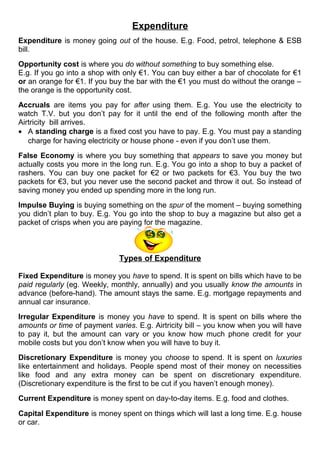Junior Cert Business Studies Expenditure
- 1. Expenditure Expenditure is money going out of the house. E.g. Food, petrol, telephone & ESB bill. Opportunity cost is where you do without something to buy something else. E.g. If you go into a shop with only Ōé¼1. You can buy either a bar of chocolate for Ōé¼1 or an orange for Ōé¼1. If you buy the bar with the Ōé¼1 you must do without the orange ŌĆō the orange is the opportunity cost. Accruals are items you pay for after using them. E.g. You use the electricity to watch T.V. but you donŌĆÖt pay for it until the end of the following month after the Airtricity bill arrives. ŌĆó A standing charge is a fixed cost you have to pay. E.g. You must pay a standing charge for having electricity or house phone - even if you donŌĆÖt use them. False Economy is where you buy something that appears to save you money but actually costs you more in the long run. E.g. You go into a shop to buy a packet of rashers. You can buy one packet for Ōé¼2 or two packets for Ōé¼3. You buy the two packets for Ōé¼3, but you never use the second packet and throw it out. So instead of saving money you ended up spending more in the long run. Impulse Buying is buying something on the spur of the moment ŌĆō buying something you didnŌĆÖt plan to buy. E.g. You go into the shop to buy a magazine but also get a packet of crisps when you are paying for the magazine. Types of Expenditure Fixed Expenditure is money you have to spend. It is spent on bills which have to be paid regularly (eg. Weekly, monthly, annually) and you usually know the amounts in advance (before-hand). The amount stays the same. E.g. mortgage repayments and annual car insurance. Irregular Expenditure is money you have to spend. It is spent on bills where the amounts or time of payment varies. E.g. Airtricity bill ŌĆō you know when you will have to pay it, but the amount can vary or you know how much phone credit for your mobile costs but you donŌĆÖt know when you will have to buy it. Discretionary Expenditure is money you choose to spend. It is spent on luxuries like entertainment and holidays. People spend most of their money on necessities like food and any extra money can be spent on discretionary expenditure. (Discretionary expenditure is the first to be cut if you havenŌĆÖt enough money). Current Expenditure is money spent on day-to-day items. E.g. food and clothes. Capital Expenditure is money spent on things which will last a long time. E.g. house or car.
- 2. Page 17 ŌĆō Q2 Dr. Date Analysed Cash Account Details Fo. Bank No. 1st Dec Balance b/d 2nd Dec Wages Date Details Ōé¼ Fo. No. 70 7th Dec 800 9th Dec Petrol Cq. 50 Supermarket ATM Cr. Bank Food Car Entertainment Ōé¼ 30 110 30 110 14th Dec 15th Dec Petrol Cq. 52 30 30 Supermarket Cq. 53 120 Petrol Cq. 54 30 30 29th Dec Car Service Cq. 55 120 120 30th Dec 385 30 28th Dec 1st Jan 30 15 23rd Dec Balance b/d Cq. 51 ATM 21st Dec 870 Petrol Cinema Balance c/d 15 120 385 870 230 240 15
- 4. Page 18 ŌĆō Q3 Dr. Date Details Fo. Bank No. 1st Jan Balance b/d 3rd Jan Wages 1st Feb Balance b/d Cash Account Date Details Ōé¼ 80 8th Jan Train Supermarke 2000 9th Jan t 13th Jan Train 16th Jan Clothes 22nd Jan Train Supermarke 26th Jan t 29th Jan Train 30th Jan Rent 31st Jan Balance c/d 2080 1045 Fo. No. Cr. Bank Food Travel Other Ōé¼ Cq. 59 15 Cq. 60 Cq. 61 ATM 40 15 80 Cq. 62 15 ATM Cq. 63 ATM 55 15 800 1045 2080 15 40 15 80 15 55 15 800 95 60 880




